
Jefferson Airplane was an American rock band based in San Francisco, California, that became one of the pioneering bands of psychedelic rock. Formed in 1965, the group defined the San Francisco Sound and was the first from the Bay Area to achieve international commercial success. They headlined the Monterey Pop Festival (1967), Woodstock (1969), Altamont Free Concert (1969), and the first Isle of Wight Festival (1968) in England. Their 1967 breakout album Surrealistic Pillow was one of the most significant recordings of the Summer of Love. Two songs from that album, "Somebody to Love" and "White Rabbit", are among Rolling Stone's "500 Greatest Songs of All Time".

Jefferson Starship is an American rock band from San Francisco, California, formed in 1974 by a group of musicians including former members of Jefferson Airplane. Between 1974 and 1984, they released eight gold or platinum-selling studio albums, and one gold-selling compilation. The album Red Octopus went double-platinum, reaching No. 1 on the Billboard 200 chart in 1975. The band went through several major changes in personnel and genres through the years while retaining the Jefferson Starship name. The band name was retired in 1984, but it was picked up again in 1992 by a revival of the group led by Paul Kantner, which has continued since his death in 2016.

Quicksilver Messenger Service is an American psychedelic rock band formed in 1965 in San Francisco. The band achieved wide popularity in the San Francisco Bay Area and, through their recordings, with psychedelic rock enthusiasts around the globe, and several of their albums ranked in the Top 30 of the Billboard Pop charts. They were part of the new wave of album-oriented bands, achieving renown and popularity despite a lack of success with their singles. Though not as commercially successful as contemporaries Jefferson Airplane and the Grateful Dead, Quicksilver was integral to the beginnings of their genre. With their jazz and classical influences and a strong folk background, the band attempted to create an individual, innovative sound. Music historian Colin Larkin wrote: "Of all the bands that came out of the San Francisco area during the late '60s, Quicksilver typified most of the style, attitude and sound of that era."
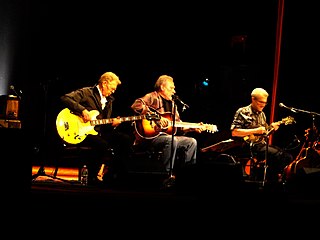
Hot Tuna is an American blues rock band formed in 1969 by former Jefferson Airplane members Jorma Kaukonen (guitarist/vocals) and Jack Casady (bassist). Although it has always been a fluid aggregation, with musicians coming and going over the years, the band's center has always been Kaukonen and Casady's ongoing collaboration.

Tower of Power is an American R&B and funk based band and horn section, originating in Oakland, California, that has been performing since 1968. There have been a number of lead vocalists, the best-known being Lenny Williams, who fronted the band between early 1973 and late 1974, the period of their greatest commercial success. They have had eight songs on the Billboard Hot 100; their highest-charting songs include "You're Still a Young Man", "So Very Hard to Go", "What Is Hip?", and "Don't Change Horses ".

John Michael Thomas is an American rock singer, best known as one of the lead vocalists of Jefferson Starship and Starship.

Starship is an American rock band from San Francisco, California. Initially a continuation of Jefferson Starship, it underwent a change in musical direction, the subsequent loss of personnel, and a lawsuit settlement that led to a name change. Starship's 1985 album, Knee Deep in the Hoopla, was certified platinum by the RIAA, and included two singles that went to number one on the US Billboard Hot 100 chart: "We Built This City" and "Sara". Their follow up album, No Protection, released in 1987, was certified gold and featured the band's third number one single, "Nothing's Gonna Stop Us Now". After a short hiatus in the early 1990s, the band reformed in 1992 as "Starship featuring Mickey Thomas" and resumed touring.

Bless Its Pointed Little Head is a live album by Jefferson Airplane recorded at both the Fillmore East and West in the fall of 1968 and released in 1969 as RCA Victor LSP-4133.

Jefferson Airplane is the eighth and final studio album by San Francisco rock band Jefferson Airplane, released on Epic Records in 1989. Marty Balin, Paul Kantner, Grace Slick, Jorma Kaukonen and Jack Casady all returned for the album and supporting tour, though Spencer Dryden did not participate. The album and accompanying tour would mark the last time Jefferson Airplane would perform together until their 1996 induction to the Rock and Roll Hall of Fame.

Cobra Starship was an American dance-pop band founded in 2005 by Gabe Saporta (ex-Midtown), and headquartered in New York City. He recorded the first album as a solo project, While the City Sleeps, We Rule the Streets. Saporta later enlisted guitarist Ryland Blackinton, bassist Alex Suarez, drummer Nate Novarro, and keytarist Victoria Asher, all of whom provide backing vocals.
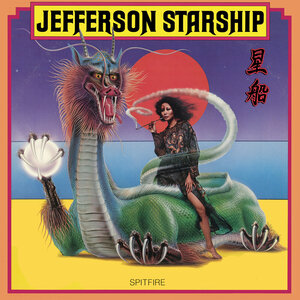
Spitfire is the third album by American rock band Jefferson Starship. Released in 1976, a year after the chart-topping Red Octopus, it quickly scaled the charts, peaking for six consecutive weeks at No. 3 in Billboard and attaining a RIAA platinum certification. The album features writing contributions from members of singer Marty Balin's former band Bodacious DF, as well as Jesse Barish, who became one of Balin's frequent collaborators. Stereo and quadraphonic mixes of the album were released. "Song to the Sun" was included in the 1977 Laserock program.
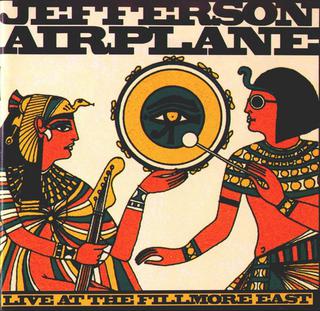
Live at the Fillmore East is an album by the rock band Jefferson Airplane. It was recorded on May 3 and 4, 1968, at the Fillmore East in New York City. It was released on April 28, 1998. It is not to be confused with the similarly named Jefferson Airplane album Sweeping Up the Spotlight: Live at the Fillmore East 1969.
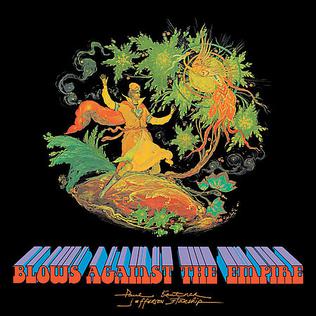
Blows Against the Empire is a concept album by Paul Kantner, released in 1970 under the name Paul Kantner and Jefferson Starship. It is the first album to use the "Starship" moniker, a name which Kantner and Grace Slick would later use for the band Jefferson Starship that emerged after Jack Casady and Jorma Kaukonen left Jefferson Airplane. From a commercial standpoint, it performed comparably to Jefferson Airplane albums of the era, peaking at No. 20 on the Billboard 200 and receiving a RIAA gold certification. It was one of the first two albums to be nominated for a Hugo Award in the category of Best Dramatic Presentation.

Earth is the fourth album by American rock band Jefferson Starship. The album was recorded in 1977, with the same band lineup as the previous album, Spitfire and released in 1978.

Deep Space/Virgin Sky is a 1995 album by Jefferson Starship recorded live at the House of Blues in West Hollywood on the Sunset Strip. The concert was performed as a benefit memorial for violinist Papa John Creach, who had died in 1994, with proceeds going to his family.

Jefferson's Tree of Liberty is the tenth album by Jefferson Starship, released on September 2, 2008. It is the band's first studio album since 1999's Windows of Heaven. The new album includes cover songs from Irish, American, English, and Latin-American traditions. The title is a reference to Thomas Jefferson's quotation, "The tree of liberty must be refreshed from time to time with the blood of patriots and tyrants." The idea began in 2003 as "The Cuba Project", which was to include classic protest and folk songs recorded in Cuba. In 2008 the album was finally recorded but in California. About half of the songs planned for The Cuba Project were used on the final cut, with other songs coming from Jefferson Starship's previous repertoire and another project band member Paul Kantner had planned called "On the Threshold of Fire." The promotional tour for the album began in late June with shows at Larkspur, California followed by tours in the US and Europe before the album's release, and continued through December 2008 with a further tour in the US and a tour in Japan. On February 1, 2009, more tour dates and venues were announced by the band's manager Michael Gaiman, with additional plans to continue the tour through 2010 and bring it to Australia and South America. David Grisman joined the band for the April 2009 tour dates. The band's promotion for the album ended in June 2009 as the band changed their set-list to Jefferson Airplane's Woodstock Festival material and started touring with the "Heroes of Woodstock" through the end of October.
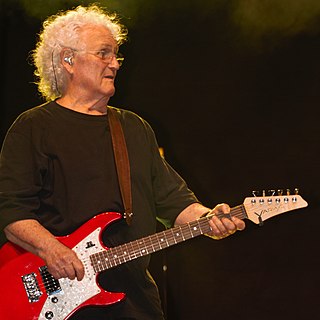
David Freiberg is an American musician best known for contributing vocals, keyboards, electric bass, rhythm guitar, viola and percussion as a member of Quicksilver Messenger Service, Jefferson Airplane, and Jefferson Starship. Among other tracks, he co-wrote "Jane", a hit for Jefferson Starship.

"Miracles" is a song written by Marty Balin and originally recorded by Jefferson Starship, appearing on its 1975 album Red Octopus.

"Count on Me" is a 1978 song and single by Jefferson Starship written by Jesse Barish for the album Earth. The single, in lighter rock mode, gave Starship another US Top 10 hit after "Miracles". It was featured in the end credits to the movies Grown Ups and The Family Stone.

"Runaway" is a 1978 song and single by Jefferson Starship, written by Nicholas Q. Dewey for the album Earth. It was the second U.S. Top 40 hit from that album, and was the follow-up to the Top 10 hit "Count On Me". The song peaked at #12 on the U.S. Billboard Hot 100 and number 13 on the Cash Box Top 100.




















